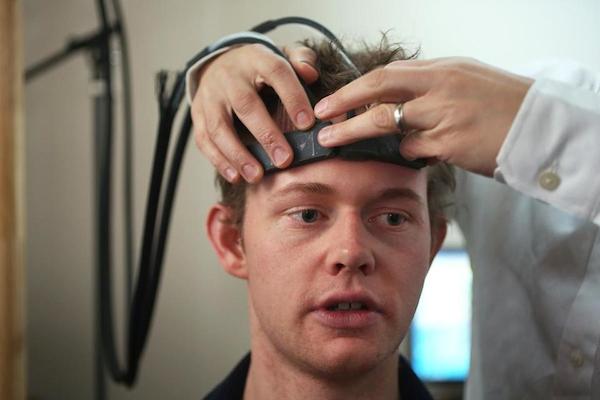Headband To Monitor Brain Activity Developed By Tufts University Researchers
Developed by Robert Jacob, a computer scientist and Sergio Fantini, a Biomedical engineer from Tufts University’s Human-Computer Interaction Lab, a new headband that will read brain's activity and use this data to figure out if the person wearing it is in an active state or not. The headband is of great use for air traffic controllers who are under a very stressful job and using this new piece of technology they can monitor if they've reached a certain mental overload. And if so, they can assign their important or critical tasks to another colleague. There are many more applications for the headband, but before indulging in them. let us take a look at the technology behind this project.
To analyze the brain activity, the duo has come up with a technology called "functional near infrared spectroscopy" or fNIRS. It involves a series of small red lights embedded in the headband that beam light waves through the skull and onto the prefrontal cortex of the brain. By connecting the headband prototype to a computer, the device can capture the amount of a person's mental exertion by measuring the amount of light absorbed by the brain. A heavily taxed brain draws more blood than one working easily, and therefore absorbs more light. That tells the computer the wearer may be overwhelmed.

The current brain monitoring systems, unlike fNIRS, require the user to wear electrodes or apply adhesive gel. Whereas, the new headband system does not cause any pain and is not harmful like the prolonged exposure to CT scan. Moving forward, the researchers aim to integrate the brain scanner with a wearable PC such as Google Glass. This way, we can see a say when humans are able to communicate with machines directly just through the thoughts.
In applications apart for air traffic controlling, the researchers used the headband system to generate movie recommendations for wearers, based on how their brains respond to other films. There's more to it, but that's all commercially possible once the research goes out of the labs and into mass production. Till then, let us know what you think about the current research work form Tufts University.
Source: Headband could help brain communicate with computers - The Boston Globe
To analyze the brain activity, the duo has come up with a technology called "functional near infrared spectroscopy" or fNIRS. It involves a series of small red lights embedded in the headband that beam light waves through the skull and onto the prefrontal cortex of the brain. By connecting the headband prototype to a computer, the device can capture the amount of a person's mental exertion by measuring the amount of light absorbed by the brain. A heavily taxed brain draws more blood than one working easily, and therefore absorbs more light. That tells the computer the wearer may be overwhelmed.

The current brain monitoring systems, unlike fNIRS, require the user to wear electrodes or apply adhesive gel. Whereas, the new headband system does not cause any pain and is not harmful like the prolonged exposure to CT scan. Moving forward, the researchers aim to integrate the brain scanner with a wearable PC such as Google Glass. This way, we can see a say when humans are able to communicate with machines directly just through the thoughts.
In applications apart for air traffic controlling, the researchers used the headband system to generate movie recommendations for wearers, based on how their brains respond to other films. There's more to it, but that's all commercially possible once the research goes out of the labs and into mass production. Till then, let us know what you think about the current research work form Tufts University.
Source: Headband could help brain communicate with computers - The Boston Globe
Replies
-
 NisamI would like to appreciate for your Intention to Share information..!!! 😀
NisamI would like to appreciate for your Intention to Share information..!!! 😀
You are reading an archived discussion.
Related Posts
Hello people! 😀
This is Chhavi here!! I describe myself as "A Simple girl with a caring heart, truthful soul and ambitious mind."
I am an Electronics Engineer. Placed at...
*Engineering Trade: Software Development
Location: Bangalore
*Occupation: Working with Ricoh Innovations
Work Experience: around 8.5 Years of industry experience
*Hobbies & Interests: Music, Travel, Surfing, Reading, Dancing
*Aim in life:...
Name: Kalamalini S
*Engineering Trade: Electrical & Electronics
Location: Bangalore
*Occupation: Self-Employed - Working from home for an Information Management company as web researcher
Work Experience: 9.5years on the present...
Just signed up for koding.com, Really surprised with features, speed and given freebies.
It is giving you free development environment with terminal Ubuntu with 2GB ram and 3GB space. You...
After playing a bit with both (Stock Android UI on Moto G) and TouchWiz on Note II; I've come to a conclusion that Samsung's TouchWiz scores over the stock Android...
